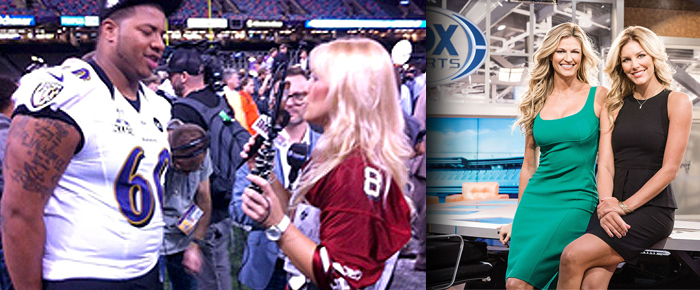
By Julie Buehler
I’ve been hosting my own sports talk radio show for years now, even carved out some California broadcasting history in the process. I’m still asked, “How do you know so much about sports?”
I’ve been the only woman in press row, running up and down stadium stairs to get the best quotes before deadline. Watching me work, a male colleague who hadn’t moved from press row said, “I can’t believe you ran stadium stairs in high-heels.”
If I present historical fact to support my claims in sports debates, it’s common to hear the men in the conversation say, “Wow, you know more about sports than most guys I know.”
So even in building a groundbreaking career, working hard to get a story or simply casually chatting sports, the bar for women, intellectually, in the world of sports is far too low.
Many men, and women as well, conclude the world of sports is dominated by men and knowledge is distributed based on the amount of testosterone surging through one’s veins. Some believe that only women who grow up around men are inclined to venture into the world of sports, and perhaps 50 years ago when athletics were rarely pursued by women that might have been true. But today’s world is far more open and knowledge is no longer passed down one person to the next.
The simple fact is that women have the same capacity to ascertain sports knowledge as any guy. The difference is not as many have a platform to disseminate it. If a woman is talking sports in a bar, but there’s no camera to capture it, does it change our culture? Answer is: Absolutely. But slowly.
The women in front of the cameras in sports media are rarely analyzing sports, offering unique perspective or opinion, instead just asking their male counterparts to opine. That leads less-educated viewers to conclude these women are not as well versed in sports, merely props or eye candy. Until women are given prominent analytical or opinion-generating roles, that perception will persist.
Studies show a steady and impressive increase in female fans of the major male sports, yet the national sports media has not increased in female analyst for the NFL, NBA or MLB. There are sideline reporters, round-table hosts and sidekicks. Very few women headline in the world of sports.
Some see this as an affront to women in sports media, but it’s not. It’s a product of time and the process of cultural change. I believe as more women spend the necessary decades in the industry to gain invaluable experience and credibility, we will see them in front of cameras offering key insight and analysis.
It’s only been a few decades that women have even been allowed in the locker rooms and the battles waged by those early pioneers, many of whom I’ve had the honor to speak with, have left enduring scars that younger women coming up can’t fathom.
While I field sophomoric questions about my high-heels and origin of understanding, those women fielded harassing calls at all hours of the night, were physically taken outside the locker room and subjected to countless indignities; all because they wanted to cover sports.
Times are changing and there are encouraging signs that the gap between the perception of women in sports and the reality of women in sports is closing. Women are asserting themselves more as experts with quality analysis and unique perspective.
I’ll know we’ve arrived when no one is surprised that I understand the difference between the A-gap and B-gap and relate the increasing importance of a pass rush.
Julie Buehler hosts the Coachella Valley’s most popular sports talk radio show, “Buehler’s Day Off” every day from 3-6 on 1010 KXPS, the valley’s all sports station. She’s an avid gym rat, slightly sarcastic and more likely to recite Steve Young’s career passing stats than American Idol winners. Tune in M-F 3-6 pst at www.team1010.com or watch the show on Ustream.












































